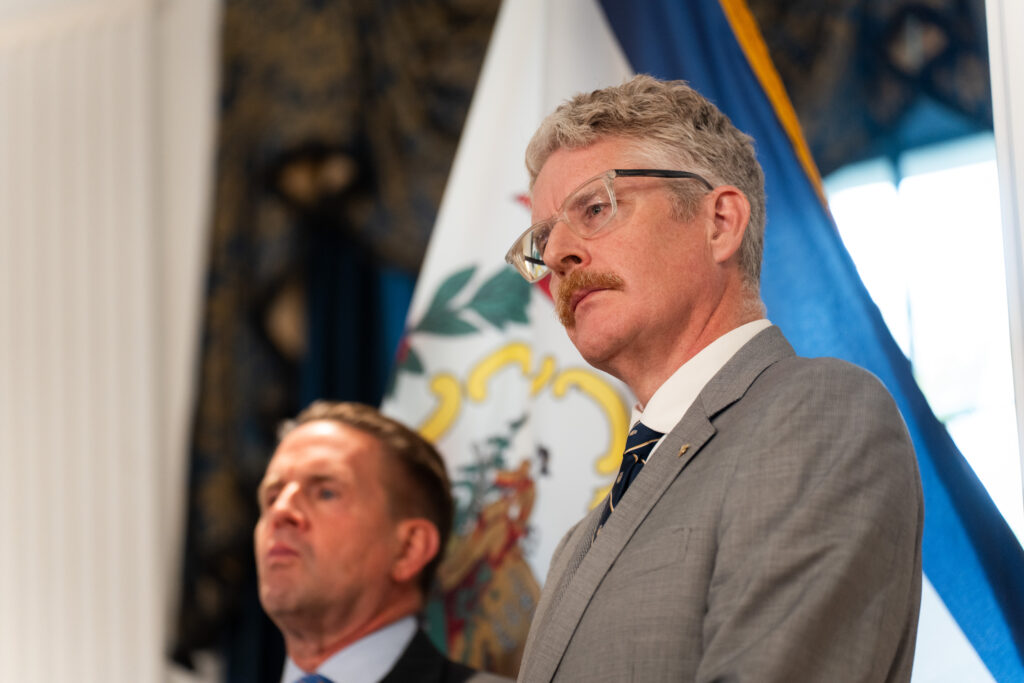The director of a newly formed center for civics at West Virginia University has been announced.
Gov. Patrick Morrisey announced Patrick Lee Miller for a five-year term as the first Director of the Washington Center for Civics, Culture and Statesmanship at a press conference Wednesday.
House Bill 3297 required WVU to open the Washington Center and hire “an expert on the western tradition, the American founding, and American constitutional thought,” that has “publicly demonstrated, through speeches, publications, or presentations, a commitment to the purposes, goals, and policies of the center.”
Miller most recently worked as an Associate Professor of Philosophy at Duquesne University since 2012, with previous positions at Duke University and Doshisha University in Kyoto, Japan.
In 2008-2009, Miller was a fellow at the Center for Hellenic Studies at Harvard University. He has a Ph.D. in Philosophy from the University of North Carolina at Chapel Hill, a D.A.D. from the Psychoanalytic Institute of the Carolinas, M.A.s in Greek and Philosophy from the University of North Carolina at Chapel Hill, and a B.A. in Philosophy from McGill University in Montreal.
In creating the Washington Center, Morrisey said the goal was to renew a commitment to civic education.
“We said we wanted to teach students how to think, not what to think, and we wanted to ensure that the values that made America great are taught with honesty and pride,” he said.
Morrisey said universities across the country have lost sight of what higher education is supposed to be about, becoming “echo chambers for political ideology where dissenting opinions are not only discouraged, but punished.”
“As your governor, I can assure you, I will not tolerate that type of political indoctrination,” he said. “On my watch in West Virginia, we want to encourage students to think critically, but also to explore competing ideas.”
The governor said the vision behind the Washington Center was to allow students to be “truth seekers” through debate, unshackled by those who want to stifle opinion.
“We want students to be able to study the Constitution and our country’s founding and not be punished for celebrating the achievements and advancements and the freedom that’s made the United States the greatest country on the face of the earth,” Morrisey said.
When the legislature passed to create the center in April, there were questions about funding such a project so soon after WVU’s $45 million budget in 2023. Wednesday Morrisey said he was encouraged by the university’s new direction under President Michael Benson and highlighted an effort to build around the Washington Center.
“We know the state of West Virginia has already dedicated $1.5 million to launch the Washington Center, to hire faculty, to develop courses and begin building a program that’s going to serve students for generations to come,” Morrisey said. “This is an investment in our future, our civic institutions? And it’s a way we can demonstrate the American idea right here in our home state of West Virginia.”
The bill to create the Washington Center stipulates Miller has until Nov. 11 to appoint a seven-member academic council for the center, “comprised of scholars with relevant expertise and experience.”
Miller said he hoped to create a place where young West Virginians can learn about and revere the civilization and country he viewed as “the greatest.”
“My vision is to train students in the Western tradition, starting with ancient Greece and Rome through the framing of the U.S. Constitution and up to the present crisis,” he said. “I believe that in order to understand this crisis, students must understand how we got here.”
Miller said the development of the Washington Center would not be exclusively intellectual, but to also train future leaders who could understand and solve what he called “the crisis.”
Asked for clarification, Miller said recent political violence indicated there was such a crisis.
“To talk about its precise nature and its causes. It’s not, this is not the time for that,” he said. “But as I said, what I hope to do is to tell a history of how we got here, so that the students can understand that question.”























